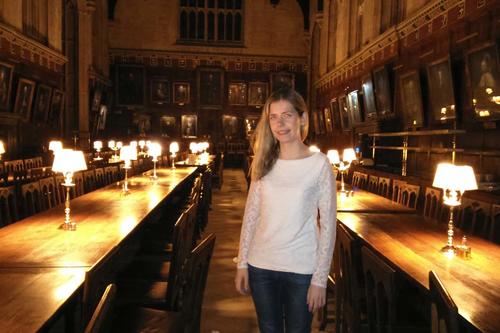100,000 Words in Three Years
Letter from the UK! Helena Winterhager recommends waiting until the graduate level to go to Oxbridge.
Dec 04, 2015
Helena Winterhager in the dining hall of Christ Church, arguably the best-known college of the University of Oxford. The room was used as a model for the Harry Potter films.
Image Credit: Private
The Radcliffe Camera: the reading room building of the famous Bodleian Library.
Image Credit: Private
The impressive library of Lincoln College is considered one of the nicest college libraries – a calm, quiet place to study in the heart of the city.
Image Credit: Private
The Radcliffe Camera: the reading room building of the famous Bodleian Library.
Image Credit: Private
A hundred thousand, and three – those are the magic numbers that are currently shaping my study programme. My PhD thesis is supposed to be finished in three years (at least if I stay in Oxford that long), and it is not supposed to exceed 100,000 words, or some 200 pages. The first of these numbers constitutes a healthy upper limit that saves students from writing all too long dissertations, and the other is a helpful deadline that makes sure candidates keep their research work focused on the final objective. Writing a dissertation in Oxford also means extensive support and supervision so that these targets can actually be met: I have to report to my supervisor every two or three weeks and present newly written sections of my work.
On the whole, though, it can be said that the differences between Oxbridge and study conditions in Germany don’t seem to be all that great for graduate students, either those pursuing a doctorate or at the master’s level – at least in the humanities, where I can judge. By contrast, there are much starker differences at the undergraduate level, which has to do with the whole way the bachelor’s degree programme is set up at British universities and the professional prospects associated with it.
Career Changes Are Common in the UK
Here, like in Germany, students major in a specific subject during the B.A. phase, but it definitely does not go without saying that graduates will also work in that same field. Especially at the top universities Oxford and Cambridge, a three-year bachelor’s programme is more like a kind of fundamental education with only a limited emphasis on academic specialization. Instead, the focus during this period is on acquiring key intellectual skills. The workload is extremely heavy, the pressure intense. Students are supposed to prove that they can perform even under great pressure. Alongside quality in a specific discipline, some of the main criteria are a good, original writing style and analytical and rhetorical skills.
Those who successfully complete this “elite” education are qualified for higher tasks, not just in the subject they have studied, but also in any possible area of public life. Graduates with a B.A. in Latin or History can embark on a career in finance or law, business or civil service without further ado. In the UK, these are not exotic career change scenarios, but rather completely normal professional paths.
Large Percentage of International Students among Postgraduates
The striking difference between undergraduates and postgraduates is also apparent from the fact that only 18 percent of undergraduate students in Oxford come from countries outside the UK, as compared with 62 percent of graduate students. On the one hand you have more of a national “elite” education, while on the other hand the graduate sphere represents an incredibly international university setting, basically a “world university.” After getting to know both fields (now being in Oxford as a graduate, I previously spent a while as an undergraduate student in Cambridge), I would always recommend that my German fellow students wait until the graduate phase to apply for Oxbridge. From an academic standpoint you will gain more, and the cosmopolitan atmosphere is unparalleled!



